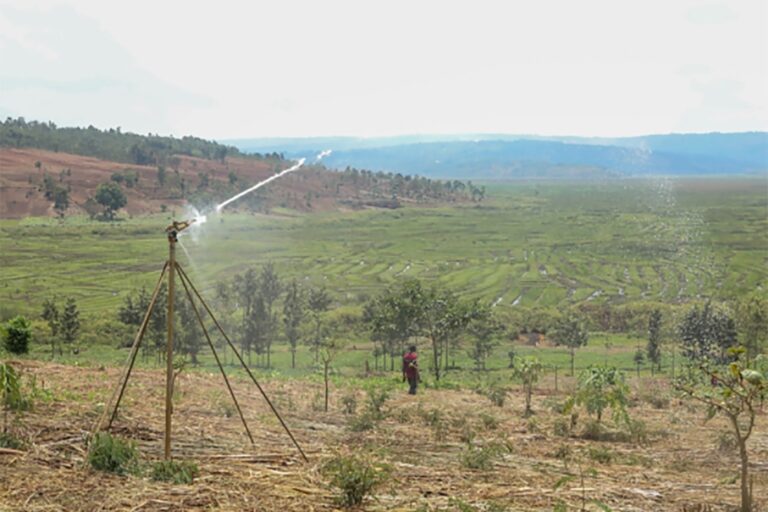KIREHE, RWANDA — Across Africa, a quiet revolution is transforming smallholder agriculture: the integration of renewable energy technologies, especially solar power, is reshaping farming practices, boosting yields, and fostering resilience in rural communities.
With agriculture employing over 60% of Africa’s workforce, energy access is emerging as a critical component of food security and economic development. In Rwanda’s Kirehe District, where drought has long challenged farmers, the shift toward solar-powered irrigation is changing lives.
Victor Ndwaniye, a father of six from Nasho village, once irrigated his vegetable farm manually using buckets. Since 2020, he has adopted a solar-powered irrigation system that has drastically improved his efficiency and yields. “Before, I harvested only one ton per hectare. Now, I get three,” he shared.
Rwanda is among several African nations scaling renewable energy use in agriculture. Government targets aim to increase the area under solar irrigation from 646 hectares to over 1,100 hectares by 2029. The Rwanda Agriculture and Animal Resources Development Board (RAB) reports that more than 1,100 farmers and nearly 300 cooperatives are already using solar-powered irrigation systems.
These initiatives form part of a broader strategy, championed by organizations like the World Resources Institute (WRI), to embed clean energy across agricultural value chains. The initiative—referred to as the Productive Use of Renewable Energy (PURE)—emphasizes integrating solar and other renewables into processes such as irrigation, crop processing, refrigeration, storage, and transportation.
“Renewable energy is not only reducing reliance on costly diesel generators but also improving incomes and productivity for small-scale farmers,” said Benson Ireri, WRI’s Africa Lead for Energy Access. “It’s an essential step toward a climate-resilient and economically viable agricultural future.”

While benefits are clear, affordability remains a hurdle. The upfront cost of solar systems is high for many rural farmers, despite financial assistance from governments and partners. Still, efforts to expand access are bearing fruit.
Research from the University of Sheffield indicates that solar irrigation can be a transformative solution for African agriculture, especially in regions where rainfed farming is no longer sustainable due to erratic weather. With 95% of cultivated land in sub-Saharan Africa relying solely on rainfall, irrigation powered by renewable energy offers a path to more stable production.
“The technology has become a standard option in off-grid areas,” noted Jerome Hitayezu, head of irrigation programs at RAB.
Increased crop diversity and year-round farming are just some of the tangible benefits farmers are reporting. As Ndwaniye puts it, “We are less dependent on the weather now. With solar-powered irrigation, we can grow more crops throughout the year.”
Beyond individual farms, WRI and its partners are collaborating with financial institutions, local enterprises, and policymakers to scale these technologies. The economic potential is significant—according to the International Renewable Energy Agency, off-grid solar technologies are also creating jobs in technical and support roles across sub-Saharan Africa.
In a region where 600 million people still lack access to electricity, integrating renewables into productive sectors like agriculture could be a game-changer—not only for food security, but for livelihoods and the environment.
“Clean energy is needed at every stage of the agriculture value chain,” Ireri emphasized. “The opportunity to empower farmers while reducing emissions is one we cannot afford to miss.”
As the green energy wave continues to spread across rural Africa, farmers like Ndwaniye are proving that with the right tools, even the smallest plots of land can yield a prosperous future.
This is a dynamically generated comment by David Smith.